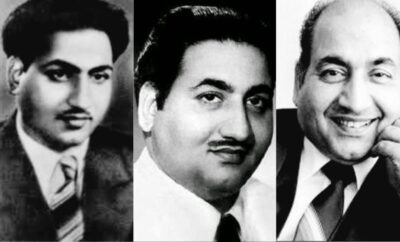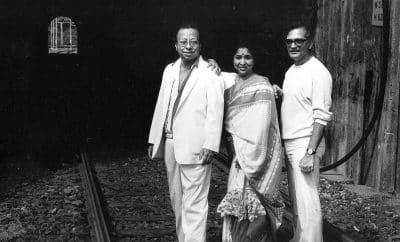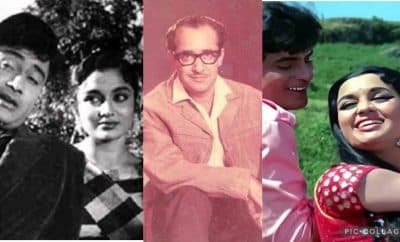Collections
Dr. Bhupen Hazarika: Unexplored nectar from the NorthEast!
When someone utters Northeast, we are instantly reminded of Bihu, tribal richness, chilly mountains, and soothing refreshing tea. But one name which binds all these elements together and much more is Dr. Bhupen Hazarika aka Bhupen da. A soft voice which has mesmerized the music aficionados over decades but has stayed in shadows by choice. Introduction to the Bharat Ratna awardee Bhupen da to the mainstream music was through the towering success of Rudaali. In 1993 when Rudaali received critical accolades and love by masses, suddenly everyone took notice of this rustic but pure baritone which pierced through our hearts with male renditions of the songs in the movie. Slowly everyone realized that the more one knows about the man, more we realize how less we know about him!
Dr. Bhupen Hazarika was born in Sadiya town of Assam on September 8th 1926. He was discovered by a noted playwright and movie maker in Tezpur and at the age of 13, young Bhupen recorded his first playback songs for an Assamese film and never looked back. He was an educationist who understood the importance of art and music in making a point and rightfully earned his doctorate in the thesis of engaging audio video techniques in adult education in the 1940s. Walking the talk, he joined Indian People’s Theatre Association (IPTA) and involved himself in bridging the gap between the northeast and the mainstream.
His engagement with art and music was with a clear mission! He created music and wrote songs which spoke of inclusion and each of his songs stood out for its immense contribution to the north east people. So while the public in other states might know him as an award winning music composer of Rudaali, it is imperative to look into his works beyond commercial cinema and celebrate the social reformer in him who worked relentlessly for the people of his soil.
A proud Axomia
His deep knowledge and respect for his motherland reflected beautifully through his songs. For. Instance his song Ami Asamiya is one of the most loved Assamese songs which is a call to his fellow Assamese motivating them to feel proud of their cultural richness. He penned this song at the time when Assam was at the peak of its glory and politics had just started affecting people’s lives. Ami Axomiya Nohou Dukhiya, buli xantona lobhile nohobo
Love for Lohit
One of the most celebrated works of Bhupen da is the tribute to Brahmaputra river, which he wrote and composed in the song Bistrino Parore, in which he is questioning the river for its flow in the line Burha luit boan kio? (Luit / Lohit is another name for river Brahmaputra). Interestingly this song was influenced by the classic reform song written and composed by Paul Robeson Ol’ Man River. Bhupen da had met Paul during his visit to New York and when they discussed the song, Bhupen da couldn’t resist himself from bringing the same ethos in context of the river which influenced him a lot. Later the song was translated in Bangla by Sri Shibdas Bondopadhyay as Ganga boicho keno? Pandit Narendra Sharma did the Hindi translation as ‘Ganga Behti Ho Kyon?’ Years later, the Hindi version was brought out in a private album with Bhupen da and Kavita Krishnamoorthy as lead singers and various other artists. I guarantee, once you start playing the song, you will listen to them all in loop mode for its super catchy melody and hard hitting lyrics. Now that is what is called revolutionary writing!
Ol’ Man River –
Bistrino Parore –
Ganga –
Respecting the Ratanpuri Leaves
While on one hand, Bhupen da was writing songs with a reform agenda, on the other hand he was also ensuring to spread the flavour of Assam, passionately. He wrote a special song highlighting the richness of Ratanpuri fields of tea plantation and brought out the duty of plucking the delicate leaves into a song which is extremely hummable and takes you back to those tea gardens with flavorful aroma. In mid 90s, Gulzar saab collaborated with Bhupen da and together they released a private album ‘Main aur Mera Saya – Bhupen Hazarika’, which had the translated Hindi version of this melody ‘Ik Kali Do Pattiyan’
Assamese version –
Hindi –
Besotted Bihu
According to the people of Assam, September 8th is sort of a state festival in honour of the legend of Bhupen da. And rightly so! One of the most important events of Assam is the festival of Bihu, which Bhupen da beautifully captured in the iconic song Bihurenu Birina. Please listen to the young Bhupen’s soft voice and get immersed in the melody. In early 1980s when Kalpana Lajmi made her debut film Ek Pal, Bhupen da also entered the Hindi film circuit and used this tune as one of the songs for the film. The Hindi version had lyrics by Gulzar saab and was rendered beautifully by Bhupinder Singh, Nitin Mukesh and Bhupen da himself. One might find shades of Chadh Gayo Papi Bichuda (Madhumati) and possibly so, as Salil Chowdhry was inspired by Bihu folk for that song.
Assamese version –
Hindi version –
P.S. Talking about Ek Pal, one cannot miss the ethereal gem ‘Main toh sang jaun vanvas’ a divine melody sung equally beautifully by Lata Mangeshkar and Bhupen da.
Benign Bhupali
One remarkably interesting aspect of Bhupen da’s music has been his love for raag Bhupali. His songs in Assamese or Hindi have had a major inclination towards the pentatonic sound, giving the feel of snowcapped mountains melodiously dancing in joy! Minimal usage of instruments and maximum projection of voice was his mantra of creating illustrious melodies.
1. Let’s start with the iconic Assamese song which he dedicated to Nepalese brothers in O Bideshi Bandhu and do let us know in comment if this song reminds you of an old Hindi classic. This song got a Hindi translation in a forgotten film Mil Gayee Manzil Mujhe directed by Lekh Tandon in 1998. The Hindi version was sung by Udit Narayan and Kavita Krishnamoorthy.
Assamese version –
Hindi version –
2. We all know the cult song Dil Hoom Hoom Kare and talking about Bhupen da, we cannot not talk about that song. But have you ever heard the original version of the song? If not, then enjoy this melody right now and be mesmerized.
Assamese version –
Hindi version –
3. When MF Hussain decided to make Gajagamini with Madhuri Dixit as his muse, he wanted a different sound in each song to describe each protagonist distinctly. When Madhuri transforms into Shakuntala as one of the protagonists, Bhupen da introduces her with this beautiful gem Meri Payal bole
4. Last but not the least, Bhupen da’s last venture in Hindi films was Gandhi to Hitler (2011). Bhupen da’s health had deteriorated by then, but he wanted to render the mythical bhajan Vaishnav jana to in his style. The song has a different feel and yet retains its purity.
Sudhakantha, the nectar-throated, as he was popularly known as, left for heavenly abode almost a decade ago, but the rich legacy he has left behind can become an independent subject of understanding the north eastern part of India. He might have not fought with a sword, but the strength and confidence he gave to his people with his writing has always infused a refreshing energy in the people.
That’s what the Assamese tea is famous for, isn’t it?




Sameer Desai
September 8, 2020 at 9:16 am
Brilliant write-up. Good insight of a awesome music gem.
Sharvari
September 8, 2020 at 9:17 am
Extensively researched article.. Connects one immediately to the Ahomiya culture. A true bhumiputra of Ahom. Undoubtedly a gem! Like your style of writing too, Kalpana.
Guri Singh
September 8, 2020 at 10:35 am
Whoa! Incisive and comprehensive. Kudos, Kalpana!
Jayshree
September 8, 2020 at 10:50 am
Beautiful write up Kalpana, covering every tiny detail about Bhupen Hazarika ji, got to know so many hidden things about him Kudos.
Radhika Vashisht
September 8, 2020 at 11:25 am
Vaishnav jan its really good song,it song has really different feel
Anjali Bharti
September 8, 2020 at 11:34 am
Amazing article ?????????Di ❤️
Umar
September 8, 2020 at 12:46 pm
Thank you so much for this info, Bhupen sir is a legend.
tejoo
September 9, 2020 at 9:31 am
Wow Kalpana! Such a informative and interesting article. I really enjoyed knowing more about Bhupenda & listening to the beautiful songs!!! You’re so resourceful ???